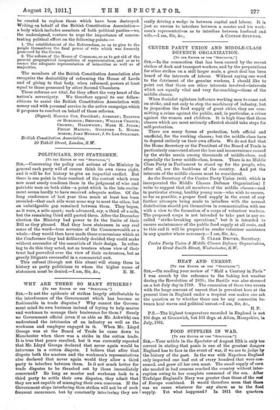POLITICIANS, NOT STATESMEN.
[To THE EDITOR OF THE "SPECTATOR."]
SIR,—Concerning the policy and actions of the Ministry in general each party will of course think its own views right, and it will be for history to give an impartial verdict. But there is one point in their conduct of the contest which even now must surely condemn them in the judgment of wise and patriotic men on both sides—a point which in the late excite- ment seems hardly to have received adequate notice. Of the long conference of last year thus much at least has been revealed—that each side went some way to meet the other, but an unbridgeable gap remained between them. They began, as it were, a mile apart; each advanced, say, a third of a mile, but the remaining third still parted them. After the December election the Ministry had power to fix the limits of their Bill as they pleased. Had they been statesmen in any real sense of the word—true servants of the Commonwealth as a whole—they would then have made those concessions which at the Conference they had deliberately decided they could make without surrender of the essentials of their design. In refus- ing to do this they acted, not as trustees whose view of their trust had prevailed over the view of their co-trustees, but as greedy litigants successful in a commercial suit.
This refusal (though not this alone) will stamp them in history as party politicians to whom the higher name of statesmen must be denied.—I am, Sir, &c., E. M.


































 Previous page
Previous page